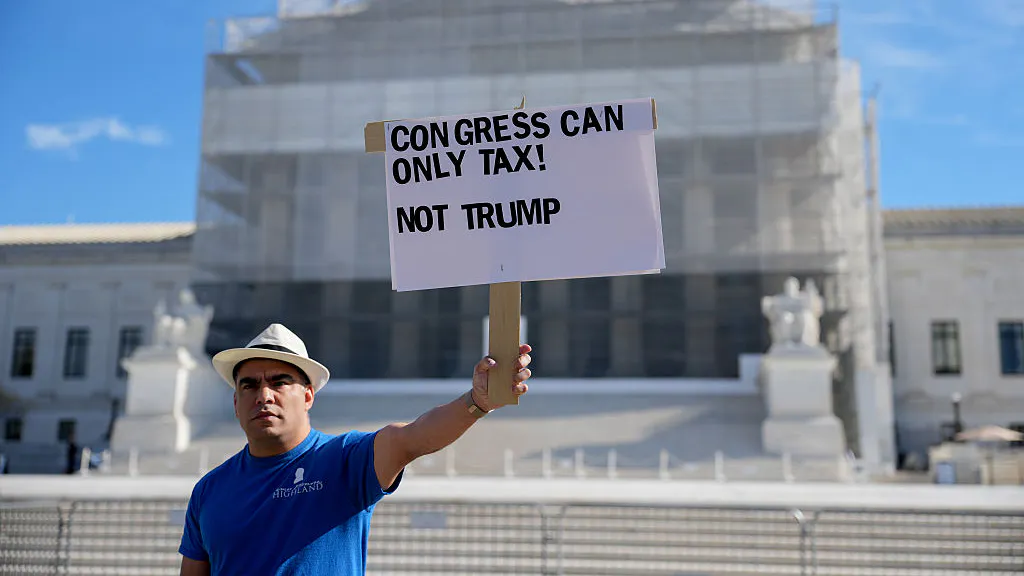The Supreme Court heard arguments on Wednesday that will determine the fate of President Donald Trump’s tariffs that he has used to bring countries around the world, including China, to the negotiating table.
The arguments, which stretched on for over two-and-a-half hours, focused on complex questions on the meaning of the 1977 International Emergency Economic Powers Act (IEEPA). The Trump administration has cited the law as justification for the tariffs it has imposed on over a hundred countries.
Solicitor General John Sauer said that the fentanyl emergency and the declining American industrial base were the impetus for the tariffs.
“President Trump has declared that these emergencies are country killing and not sustainable, that they threaten the bedrock of our national and economic security, and that fixing them will make America a strong, financially viable, and respected country again,” he said in his opening argument. “Due to IEEPA tariffs, President Trump has negotiated agreements worth trillions of dollars with major trading partners, including most recently China.”
The key questions at issue in the case revolve around the meaning of the phrase “regulate importation” in the law, whether a tariff can be considered a tax, and the tension between the president’s broad authority over foreign policy and Congress’s authority over taxation.
The tariffs have been challenged by a group of businesses represented by Neal Katyal, who served as acting solicitor general under former President Barack Obama. A group of largely Democratic-led states has also challenged the tariffs.
The justices’ responses to the arguments were mixed, with some appearing to agree with the Trump administration and others asking more adversarial questions.
The court’s three liberal justices — Elena Kagan, Sonia Sotomayor, and Ketanji Brown Jackson — all were skeptical of the Trump administration’s arguments that they had the authority to impose broad tariffs across the world.
Both Justice Clarence Thomas and Justice Samuel Alito challenged Neal Katyal, the former acting solicitor general during the Obama Administration, who argued on behalf of businesses affected by the tariffs.
Justice Brett Kavanaugh was focused on the historical precedent for the case, asking the lawyers about what they made of President Richard Nixon’s decision to impose 10% global tariffs back in the 1970s as a tool of trade negotiation.
Kavanaugh also appeared sympathetic to the administration, noting that the law allows the president to completely cut off trade with countries. He said that the position of the challengers was “unusual” because it was “taking away the president’s suite of tools when the one is much more extreme that is authorized.”
Kavanaugh noted that Trump has placed tariffs on India with the intent of ending the Russia-Ukraine War.
Justice Neil Gorsuch appeared to see the question come down to the issue of Congressional authority over taxation. He said the key context was “the constitutional assignment of the taxing power to Congress, the power to reach into the pockets of the American people is just different, and it’s been different since the founding and the Navigation Acts were part of the spark of the American Revolution.”
Justices John Roberts and Amy Coney Barrett appeared skeptical of some of Sauer’s arguments but also pressed Katyal on his claims.
“The vehicle is imposition of taxes on Americans, and that has always been the core power of Congress,” Roberts said. “So to have the president’s foreign affairs power trump that basic power for Congress seems to me to kind of at least neutralize between the two powers, the executive power and the legislative power.”
Trump, on Tuesday, wrote on Truth Social that upholding his tariffs was a matter of “life and death.”
“With a Victory, we have tremendous, but fair, Financial and National Security. Without it, we are virtually defenseless against other Countries who have, for years, taken advantage of us,” Trump wrote. “Our Stock Market is consistently hitting Record Highs, and our Country has never been more respected than it is right now. A big part of this is the Economic Security created by Tariffs, and the Deals that we have negotiated because of them.”

.png)
.png)

